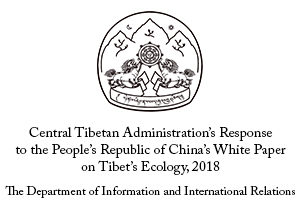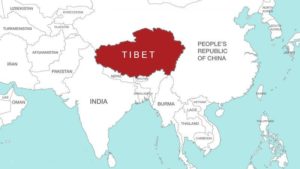

Tibet accounts for an estimated 14.5 percent of the world’s total glacier mass, but climate change and air pollution are an increasing threat to the nation’s glaciers. The retreat of these glaciers causes grasslands to shrink and permafrost to thaw. It also endangers the water supply of those who rely on the Yangtze, Mekong, Salween, Indus, Brahmaputra, and Yellow Rivers—all of which are fed by water from Tibet’s glaciers.
During the week leading up to World Environment Day, which occurred on June 5, four groups—the University of Washington’s South Asia Center, the Canada-Tibet Committee, the Mountain Resiliency Project, and the Himalayan Mountain International Film Festival—teamed up for series of events in British Columbia and Seattle, Washington to highlight why China needs to address environmental degradation. The groups hoped to bring awareness to the fact that there was too little discussion happening in China or at the United Nations about the negative environmental impacts taking place on the Tibetan Plateau and their impacts on people living downstream.
World Environment Day was established in 1972 when the UN General Assembly passed a resolution creating the celebration. June 5 was chosen because it marked the beginning of the Stockholm Conference, which took place June 5-12, 1972 and was the first, major United Nations summit on environmental issues.
A different country leads the effort each year by choosing a theme for the day that is recognized by more than 143 UN member nations. In the past, host countries and themes have included India and plastic pollution, Angola and the illegal wildlife trade, and Barbados and the dangers of rising sea levels.
China led the 2019 celebration, titled “Beat Air Pollution.” The goal was to promote renewable energy and other green technologies that could help improve air quality around the world. According to the UN World Environment Day website, more than 6 billion people breathe air that puts their health at risk. Nine out of ten people worldwide are exposed to levels of air pollution that exceed World Health Organization guidelines. That exposure is lowering life expectancy and harming economies.
Social activist, founder of the Mountain Resiliency Project, and former GlacierHub writer Tsechu Dolma spoke to GlacierHub about the China-themed World Environment Day events. “Whatever happens on the Tibetan Plateau and in the rest of Asia will impact all of our livelihoods around the world because the Tibetan plateau is home to the largest reserve of the freshwater outside of the poles,” she said.
She added that the Chinese government has devoted a lot of resources to buildings dams on the headwaters of major rivers originating in Tibet, which impacts the water supply for millions of people living in the region.
The events, said Dolma, were also meant to provide a space for Tibetans to share their opinions on China’s air pollution. “Tibetans are considered indigenous people of China,” she said, “and so [the organizers] wanted to elevate indigenous voices on what World Environment Day means for people living within China.”
Dolma stated that she believes that the Chinese government is making an effort to rectify some of the environmental damage it has caused. “It realizes that thousands of people in China are dying from pollution, and the environmental impacts directly undermine the government’s legitimacy for the people,” she said.
The high-profile participation of the Chinese government was, according to Dolma, “their way of putting in an effort.” But, she added, it was picking and choosing which issues to highlight and downplaying its role in perpetuating the problem.
World Environment Day is largely about raising public awareness about environmental degradation and providing a forum for UN nations to outline potential solutions, such as expanding access to public transportation and electric vehicles, encouraging energy efficiency and conservation, and reducing meat and dairy consumption, which produces high amounts of methane emissions. Governments were encouraged to increase investment in renewable energy, while the private sector was encouraged to cut emissions along its supply chains.
A prominent event of 2019’s World Environment Day celebration was the Mask Challenge. Organizers asked participants from around the world to post on social media a photograph of themselves wearing a protective mask and pledging to take some type of action that could help reduce air pollution. Thousands of people across the globe, including singer Ellie Goulding and model Gisele Bundchen, participated in the event using the hashtag #BeatAirPollution.










.png)











No hay comentarios:
Publicar un comentario